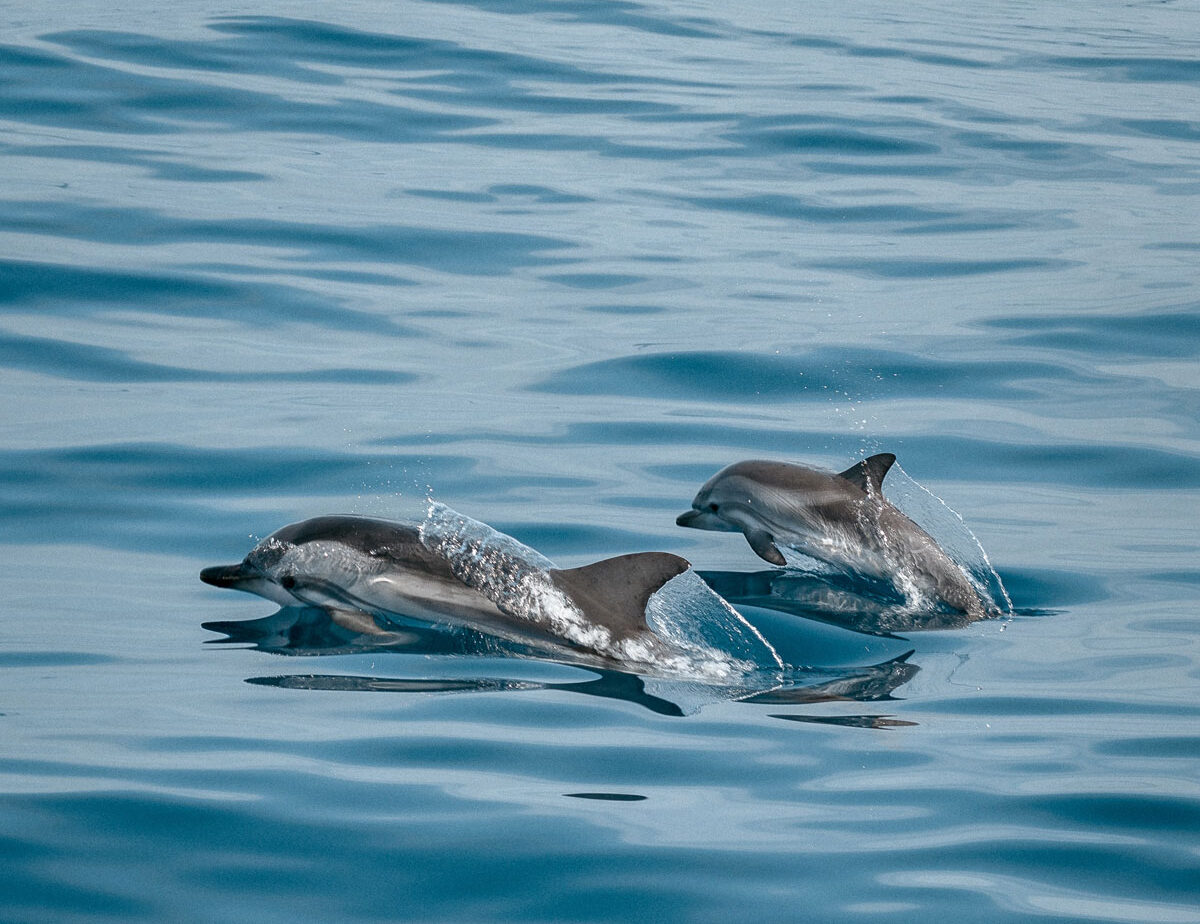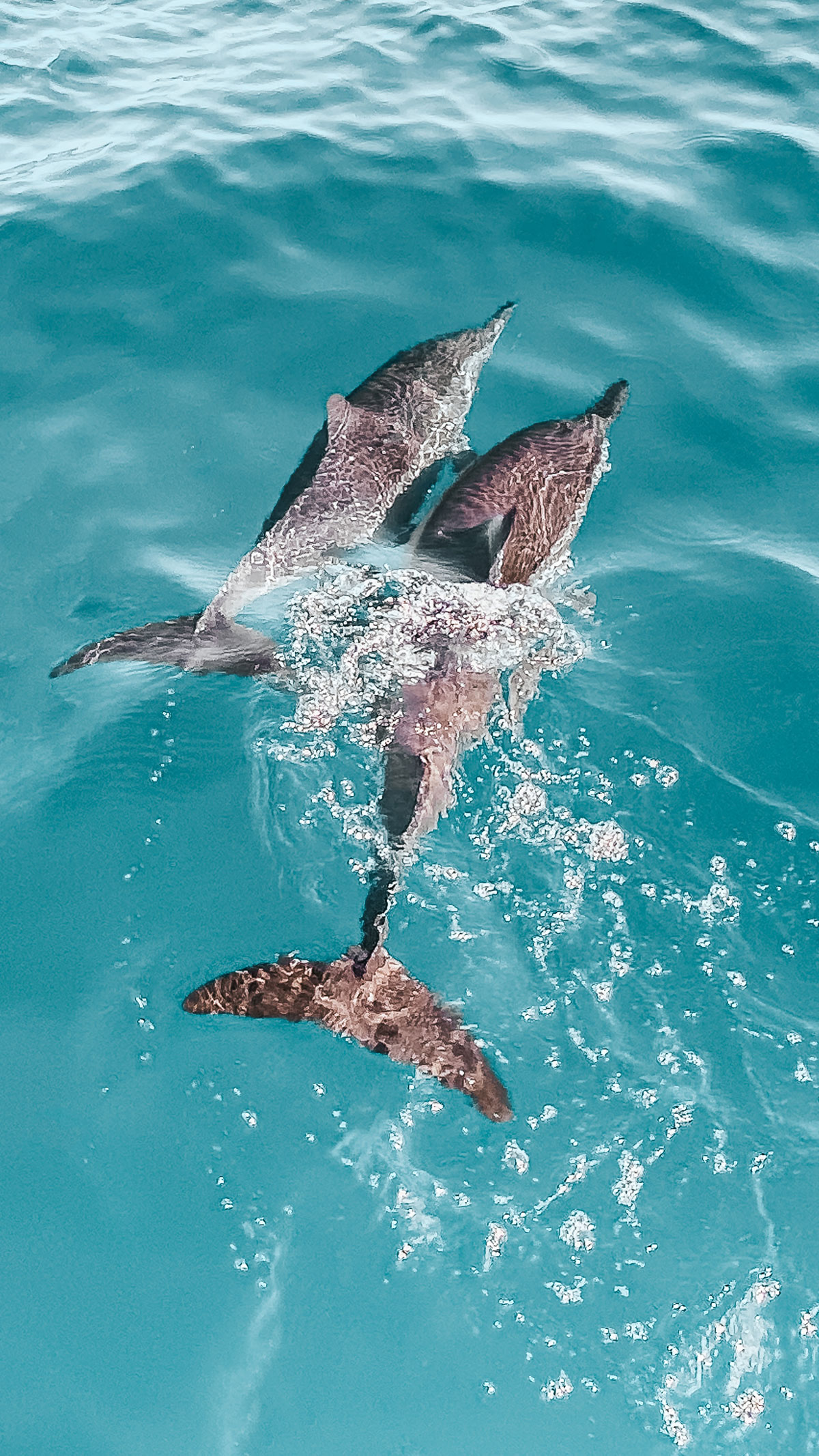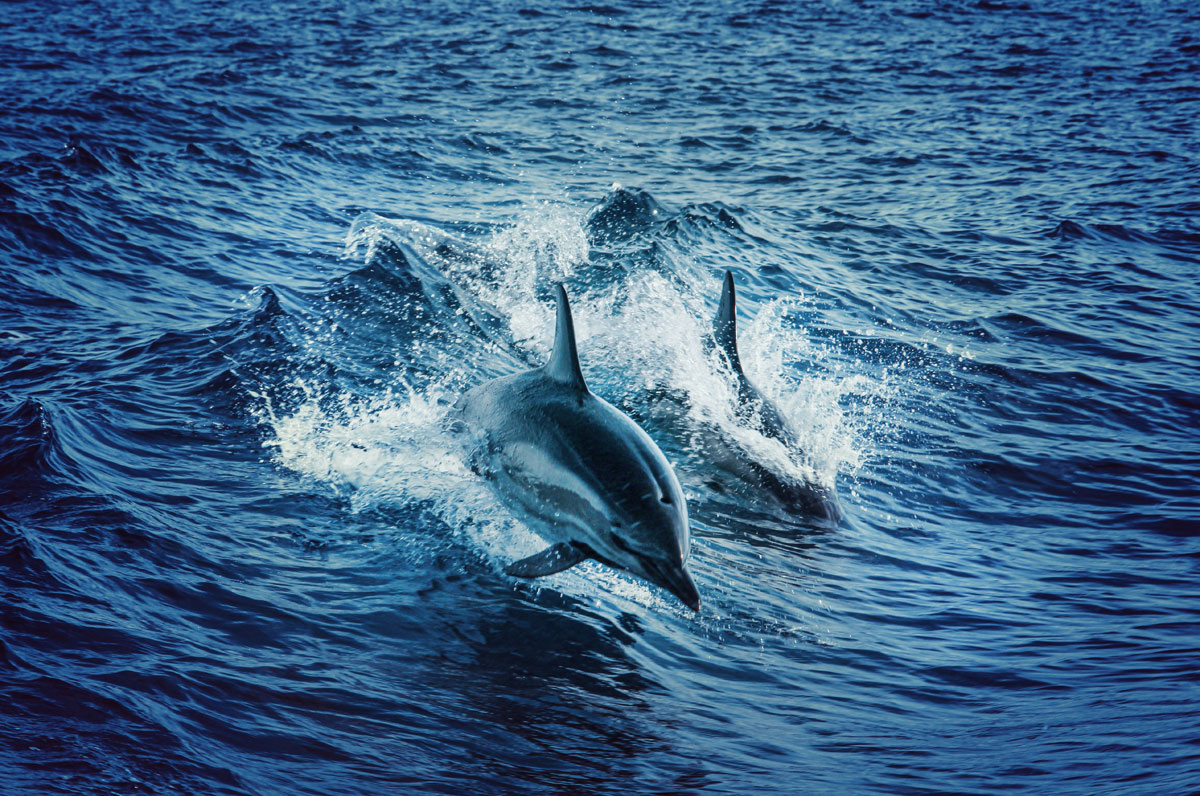
One of my many random interests is marine mammals of all kinds, including dolphins and whales. I grew up surfing in Southern California, and seeing dolphins in the water is regarded as unmistakable good luck for us surfers. This is because wherever there are dolphins, there won’t be sharks. Personally I think if dolphins only had opposable thumbs they would absolutely be running the world and not us, and we’d be better for it. We’ve known for a long time that dolphins are super intelligent and speak a complex language with each other. New research is now revealing that dolphin moms speak to their babies in high-pitched, sing-song tones, just like we do. This is so cute to me! And the study itself sounds like such a labor of love–scientists gathered data from the same 19 mama dolphins for three decades.
A study published Monday found that female bottlenose dolphins change their tone when addressing their calves. Researchers recorded the signature whistles of 19 mother dolphins in Florida, when accompanied by their young offspring and when swimming alone or with other adults.
The dolphin signature whistle is a unique and important signal — akin to calling out their own name.
“They use these whistles to keep track of each other. They’re periodically saying, ‘I’m here, I’m here’,” said study co-author Laela Sayigh, a Woods Hole Oceanographic Institution marine biologist in Massachusetts.
When directing the signal to their calves, the mother’s whistle pitch is higher and her pitch range is greater than usual, according to the study published in the journal, Proceedings of the National Academy of Sciences.
“That was true for every one of the moms in the study, all 19 of them,” said biologist Peter Tyack, a study co-author from the University of St. Andrews in Scotland.
Obtaining this data was no simple feat. Over more than three decades, scientists placed special microphones multiple times on the same wild dolphin mothers in Florida’s Sarasota Bay to record their signature whistles. That included years when they had calves and when they didn’t — dolphin calves stay with their mothers for an average of three years in Sarasota, and sometimes longer. Fathers don’t play a prolonged role in parenting.
Since sight is the dominant sense for humans and probably most apex predators (don’t quote me on that), it’s easy for us to forget how important sound is for marine mammals. Dolphins and whales, as well as seals/sea lions, all rely much more on sound than we do to make sense of their surroundings. That’s because light doesn’t travel so well in water, but sound does. Now I wonder if baby dolphins have the same thing as human babies when it comes to object permanence–if they can’t hear mom, do they think mom is not there? I know baby-talk for humans is kind of controversial and some people say you shouldn’t do it. But I think it’s okay. It’s so cute to imagine the mama dolphins calling out to their calves in baby-talk. I’m sure it makes the babies feel safe. Also, this is where I will briefly get on my soap box and say that noise pollution from boats, and from oil exploration, may be affecting marine mammals more than we realize right now. I think that if dolphins or whales can’t hear each other’s calls because of extremely loud boats, it’s harder for them to mate with each other, and probably harder for moms and babies to find each other if they are separated. I don’t know what we can do about that but it’s something I think needs more attention.
photos credit: Jonas Von Werne, Jess Loiterton and Tom Swinnen on Pexels. Fox/Simpsons screencaps via GetYarn.io and Simpsons Wiki. Here’s a link to a clip from that episode. (This is CB)















Treat animals with respect. They are living, breathing, feeling creatures. Plants apparently scream too, which is blowing my mind.
I love this story so much! Thank you!
And you are absolutely right about noise pollution undersea. It affects land based critters too. When lockdown happened, there was a lot less noise in general, and birds responded to it.
Yes, thank you!!!
“They’re periodically saying, ‘I’m here, I’m here’,” said study co-author Laela Sayigh, a Woods Hole Oceanographic Institution marine biologist in Massachusetts.”
I cried! This is adorable, and I needed a little adorable today.
Have you ever seen a baby dolphin?! Of course they talk baby talk to those tiny wittle cute wittle babies.
Dolphins like great apes and elephants have been shown to have cognitive recognition. Basically you look in the mirror and see yourself as apposed to another animal, dolphins, elephants and apes (gorillas, chimps) do that too.
Cool story! This was really fun. With human baby talk, isn’t it partly because babies hear the higher frequencies better? Baby-talk vocabulary once the kid is really talking, though, that’s a different thing altogether.
I love this stuff, it’s fascinating. I read (but don’t know how legit it is) that cats pitch their meows to humans (which are totally different from their cat to cat communication) to mimic the frequency of human babies.
I knew that cats only meow with humans, but I didn’t know they were mimicking human babies!
I am so with you, Shawna. It’s fascinating, to me, that our older people stop hearing some frequencies. I am willing to bet it’s the same with dolphins, we all adapt to talk to the people we love.
My Grandpa had Alzheimer’s, and he could hear me, at the end of his life, I am an alto. He couldn’t hear my brothers, or my Mom and Grandma, his wife. There is absolutely something about frequencies, that I hope science jumps on.
I suspect my Mom and Grandma were in the higher range, because they were so stressed out and worried about him, and I was pretty calm, and my alto was the only thing he could focus on, but I honestly have no clue.
Love this! Thank you so much for sharing these research results.
Agreed.
I love this kind of content
Thanks for covering this, fascinating and cute!
Also thank you for mentioning the issues with noise pollution and the impact on marine life. We’re doing so much damage to all these ecosystems from sheer selfishness. I lived on a boat for a few years as a child and there’s nothing like the moment when if you’ve had to use your engine to get out of the harbour you switch it off and you’re sailing. It’s amazing.
Heartwarming Heaven these mamas. Thank you so much for this lovely post.
I think all animals are fully sentient.
It is just less visible to us as humans, with our specific language sets in terms of sound, sight, body language, color spectrums etc. Therefore many people think that because they cant tell if an animals is thinking or feeling, it must simply not be….
Fascinating article! I love the very idea of mama dolphins baby-talking to their little ones! And I never thought about noise pollution in the water before. I thought about how it affected me when I worked in the Everglades & heard all those airboats, but it didn’t occur to me that it bothers the critters in the water. I remember being surprised that they considered the Everglades to be a Wilderness Area, considering those airboats. Turns out, the water column was excluded from the wilderness boundary, as were the roads. That’s some pretty fine hairsplitting, NPS!
As for apex predators relying on sight: no, not bears, at least. Bears have a better sense of smell than sight; that’s why when they spot you they’ll stick their nose in the air to sniff you out, squint at you, stick their nose again, and then decide if you’re going to be a problem. Source: me & my many bear encounters in the field.
Re: bears sense of smell – is why there are so many regulations regarding use, or prohibition, of bait in bear hunting. But that would mean humans are apex, not bears.
Fascinating! I love stuff like this. Thanks so much for posting it, Carina (your writing is great, btw). I agree with Teehee that all animals are sentient, & plants absolutely respond to touch, talking & music. (Thatsnotokay, I hadn’t heard of them screaming before; how wild!)
More posts like this, please!
This is interesting to me. When training puppies, a high pitched voice can engage them and create excitement for learning and doing the right thing. That said, however, people need to understand that using a high pitch & baby talk to an adult dog can be really insulting. I have a small dog living with me who has been rejected 4 times when placed by the rescue who pulled him from a kill shelter in California. He pays close attention during the ‘honeymoon’ period’. After 6-8 weeks though, he’s got their number, starts bossing and nagging. If they use baby-talk, he KNOWS he has the upper hand, starts (1) growling at granny, (2) biting the handyman. (3) He starts bullying elder dogs in the home and (4) he’ll just leave (run away). He was feral before rescue, so has a sense of himself outside ‘civilization’.
When people use ‘excitement’ for basic canine good manners they throw a wrench into settling a dog, and instead create chaos, confusion & anxiety (and in Jake’s case, disgust) and none of those are good for a dog’s mind. Same with all sentient creatures.
Finally, yes, plants have ‘feelings’. Back in the ’70s we put electrode patches on plant foliage, then approached them with lit cigarettes saying angrily “I’ll burn you” and the needle would go off the charts. They respond to music (mine preferred rock and roll, our instructor’s preferred classical). (note: both the instructor and myself listened to both rock and roll and classical). One guy’s plant responded most positively to jazz. It was a fascinating experiment; to that end, I have no problem believing this research on dolphins 100%.
great story, and such interesting insights, thanks so much for sharing this. I actually remember as a v small possibly pre-verbal child hating when people talked down to me, not sweet baby talk but like I was a moron. And I now never ever do that to animals or children, I talk to them in a gentle but normal voice, and I treat them like they’re intelligent, and they generally respond so well. Have a new dog now and am doing the same, but maybe have more to learn…
That is soo cute! Thankyou for the new variety in content @Carina and CB!
Wonderful. All animals should be treated with the same respect as humans. Inhumane factory farming and animal testing should never be allowed, and any “product” produced under such conditions should be boycotted. This means supermarket meat, eggs and milk. The information is readily available.
As for baby talk, I feel that it specifically expresses affection, an essential for the young.
The noise and water pollution of our seas is another tragic result of human greed “trumping” all other concerns and killing our precious planet and its miraculous diversity of inhabitants. Unbearably sad.
Thank you for this article. It breaks my heart to think about what we are doing to our oceans and the animals who live in it. Garbage, plastic, noise, and global warming. I personally think the biggest threat of global warming is that acidification of oceans will have a domino effect on ocean life.
Yes! The ocean is not an empty space that can absorb endless garbage and sound!
Very cool to learn more about dolphin parenting 🙂
Awww… 😍
Love this story, and the comments are amazing! I would love to see more of this kind of content!